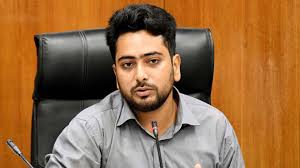

On Sunday, Md. Nahid Islam, the adviser for posts, telecommunications, and information technology, asked the European Union (EU) for assistance in halting the dissemination of false information about the student-led rebellion and guaranteeing the full trial of those responsible for mass murders.
“We want EU cooperation to stop the dissemination of various misinformation about the mass uprising worldwide and to properly complete the trial process of the mass murderers,” Nahid said during a meeting with an EU delegation led by Ambassador Michael Miller at the Posts and Telecommunications Division, according to a press release.
Additionally, he urged the EU to provide support for the treatment and rehabilitation of those injured during the uprising.
Ambassador Michael Miller expressed the EU’s support for the interim government, noting that he came to discuss basic human rights, digitization, media reform, and the electoral process. “The interim government will complete all reform processes and the democratic election process,” Miller hoped.
The adviser said political reforms are being prioritized, emphasizing that if these reforms are not implemented properly, the elections will not be successful. “We want a democratic transition as soon as possible,” he said, adding: “Before that, we want to implement some fundamental reforms.”
“Our main challenges now are to achieve economic stability and bring the law and order situation under control.”
Regarding development projects, Nahid said ongoing projects with development partners will continue, although some projects are being re-evaluated.
The EU ambassador expressed interest in collaborating with Bangladesh on cybersecurity, e-governance, digital infrastructure, data protection, and IT, stating that they are ready to provide advice on any technical issues.
The envoy further expressed interest in working to prevent the spread of misinformation on social media, aligning with the adviser’s request for EU cooperation in stopping online propaganda.
Nahid said enhancing the quality and professionalism of the media is under consideration. “It’s not possible to improve media quality and professionalism solely through government action or laws,” he said, highlighting that professionalism in the media requires proper training.
He added that security and salary structures are being considered to attract young talent to the media industry.
The adviser emphasized that media freedom and reform are the main goals of the interim government. “The Media Reform Commission has already been formed to ensure media freedom… an outline of reforms will be developed based on consensus and suggestions from stakeholders,” he added.